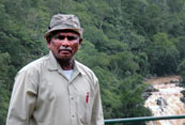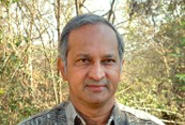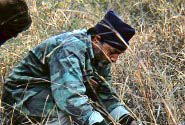TOFT Scientific Advisors
The Travel Operators for Tigers campaign needs the expertise and guidance of some of India’s leading Wildlife and Conservation scientists to ensure that what we propose, support and endorse have both practical reality and sound science behind it.
DR. A.J.T.JOHNSINGH
 Dr. A.J.T.Johnsingh is one of India’s most respected scientists, having worked tirelessly across India in conservation and field research for over thirty years, under the aegis of well known institutes including the Smithsonian Institute in Washington, the Wildlife Institute of India, Bombay Natural History Society and WWF India, and initiated pioneering field research on free-ranging large mammals in India. His research projects have ranged from Asian Elephants, to Sloth Bear, Himalayan Ibex to Golden Mahseer, and travelled and run training programmes for conservation of these species in Bhutan, China and Vietnam. While Dean of Wildlife Studies at the Wildlife Institute of India, trained over 300 managers and PHD students.
Dr. A.J.T.Johnsingh is one of India’s most respected scientists, having worked tirelessly across India in conservation and field research for over thirty years, under the aegis of well known institutes including the Smithsonian Institute in Washington, the Wildlife Institute of India, Bombay Natural History Society and WWF India, and initiated pioneering field research on free-ranging large mammals in India. His research projects have ranged from Asian Elephants, to Sloth Bear, Himalayan Ibex to Golden Mahseer, and travelled and run training programmes for conservation of these species in Bhutan, China and Vietnam. While Dean of Wildlife Studies at the Wildlife Institute of India, trained over 300 managers and PHD students.
K. Ullas Karanth, Ph.D
 “Sensibly organized wildlife tourism can contribute significantly to tiger conservation in India by directly benefiting local communities and thereby mitigating their antagonism towards tigers. It can help replace unsustainable extractive forest uses. Such tourism can also build a wider constituency in support of tiger conservation both locally and globally. Even more importantly, I believe there is both urgent need and ample opportunity to expand the land-base for tiger conservation outward from protected areas through private public partnerships that involve ecologically sensible and socially responsible wildlife tourism practices. However, it is also a sad fact that the Indian wildlife tourism sector has hitherto paid scant attention to such concerns and opportunities, largely preoccupying itself with short-term profits. In the process, it lost esteem and goodwill of conservationists as well as local communities. I believe there is a lot that industry-based initiatives such as TOFT can do to reverse this unfortunate situation. Those of us who are striving to save wild tigers against immense odds will welcome such initiatives”.
“Sensibly organized wildlife tourism can contribute significantly to tiger conservation in India by directly benefiting local communities and thereby mitigating their antagonism towards tigers. It can help replace unsustainable extractive forest uses. Such tourism can also build a wider constituency in support of tiger conservation both locally and globally. Even more importantly, I believe there is both urgent need and ample opportunity to expand the land-base for tiger conservation outward from protected areas through private public partnerships that involve ecologically sensible and socially responsible wildlife tourism practices. However, it is also a sad fact that the Indian wildlife tourism sector has hitherto paid scant attention to such concerns and opportunities, largely preoccupying itself with short-term profits. In the process, it lost esteem and goodwill of conservationists as well as local communities. I believe there is a lot that industry-based initiatives such as TOFT can do to reverse this unfortunate situation. Those of us who are striving to save wild tigers against immense odds will welcome such initiatives”.
Dr. K. Ullas Karanth obtained his MS degree in Wildlife Ecology from the University of Florida, USA in 1988 and his Doctorate in Applied Zoology from Mangalore University in 1993. Dr. Karanth is currently a Senior Conservation Scientist with the New York based Wildlife Conservation Society (WCS). He is the Director of WCS India Program and Technical Director of the new world-wide WCS Initiative Tigers Forever.
He has conducted extensive long-term research on ecology of tigers, other predators and their prey in Nagarhole Park in India. He has studied predator-prey population ecology in several reserves across India, besides conducting long-term population dynamic studies of tigers in the Western Ghats of Karnataka. His areas of expertise include capture and telemetry of big cats, animal population estimation techniques and resolving human-wildlife conflicts. He pioneered the development of camera trapping protocols, which are now used to estimate numbers of tigers, leopards, jaguars, snow leopards and cheetahs across the world.
His findings have been published in prestigious scientific journals like Proceedings of the National Academy of Sciences, USA; Ecology; PLOS biology, Journal of Animal Ecology, Journal of Zoology, Journal of Tropical Ecology, Conservation Biology and Biological Conservation as well in several scientific books published by Columbia University Press, Cambridge University Press, Island Press. He authored two acclaimed books, The Way of the Tiger and A View from the Machan, and, has co-edited (with Jim Nichols) the book Monitoring Tigers and their Prey.
He is a scientific fellow of the Zoological Society of London and serves on the editorial board of the journals Oryx and Journal of Applied Ecology. He also serves on the IUCN Species Survival Commission’s specialist groups on Cats, Elephants, Wild Cattle and Small Carnivores. Dr. Karanth has also been active in the conservation advocacy and policy arenas and serves as the Scientific Advisor to Wildlife First, a pro-active wildlife advocacy group. He is also the prime mover in a WCS-funded multi-institutional initiative that runs a Graduate Program in Wildlife Biology and Conservation at the National Centre for Biological Sciences at Bangalore. His work on tigers has been covered extensively in national and International media including Nature, Science, Time, New York Times, New Scientist, BBC, Sky, CNN and PBS.
Raghunandan Singh Chandawat, Ph.D
 One of India’s leading Field scientists and conservationists. Over the last ten year he has been instrumental in helping to save Panna National Park in Madhya Pradesh, with his pioneering and ongoing Tiger monitoring programme. Before this he spent years studying Snow leopards in the Himalayas with the Wildlife Institute of India and recently the Snow Leopard Conservancy.
One of India’s leading Field scientists and conservationists. Over the last ten year he has been instrumental in helping to save Panna National Park in Madhya Pradesh, with his pioneering and ongoing Tiger monitoring programme. Before this he spent years studying Snow leopards in the Himalayas with the Wildlife Institute of India and recently the Snow Leopard Conservancy.





